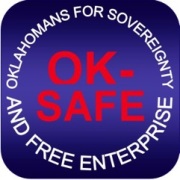OK-SAFE, Inc. – In a very interesting move the OK Senate on Thursday (3/8/12) issued a press release stating that, “legislative leaders and the chairmen of the Joint Committee on Federal Health Care Law have opted to wait until the outcome of the Supreme Court proceedings before moving further forward with SB 1629.”
SB 1629 would have established the “Health Insurance Private Marketplace Network Trust”, governed by an appointed Board, that would administer a premium assistance plan (low income insurance, Medicaid), and assist small businesses and/or employees to purchase employer-sponsored insurance.
In other words, a state-based insurance exchange, tying users of Medicaid and private insurance together; a sort of public/private partnership exchange.
But, those phone calls, emails, in-person lobbying, and robo calls, all objecting to an insurance exchange (state-based or otherwise), paid off. One bad bill has been stopped.
For now.
Score one for the people of Oklahoma!
However, in politics, there is always a Plan B. What Oklahomans can expect is some other tactic being used to achieve the same end – the establishment of some sort of web-based insurance exchange in the state of Oklahoma, that will tie into the health information exchange, which is being advanced by the Oklahoma Health Information Exchange Trust (or OHIET), unstopped.
What may happen is the utilization of the existing HUB law (HB 2026 in 2009) passed a few years ago, to create an exchange, possibly bidding out some service to a third party. (See details below press release.)
Send Thank Yous
If you would like to send a thank you for putting SB 1629 on hold, you may want to contact the following legislators, in addition to your own Senator:
- Senator Brian Bingman – bingman@oksenate.gov
- Senator Gary Stanislawski – stanislawski@oksenate.gov
- Rep. Kris Steele – krissteele@okhouse.gov
- Rep. Glen Mulready – mulready@oksenate.gov
Below is the text of the 3/8/12 Press Release, issued jointly by Senate and House leadership.
Oklahoma State Legislature
For Immediate Release: March 8, 2012
SB 1629 is on hold pending Supreme Court action
The Legislature will wait until after the U.S. Supreme Court rules on the constitutionality of the federal health care law before proceeding with Senate Bill 1629, legislators announced Thursday.
The U.S. Supreme Court is expected to rule this summer, perhaps as early as June, on a legal challenge brought by several states alleging the federal Patient Protection and Affordable Care Act is unconstitutional.
Should the high court overturn the law, the possibility exists that health insurance exchanges would not be necessary. And should the high court uphold the federal law, nuances within the majority opinion could help legislators craft the most effective Oklahoma-based marketplace possible to defend against the imposition of a federal exchange.
Given these dynamics, legislative leaders and the chairmen of the Joint Committee of Federal Health Care Law have opted to wait until the outcome of the Supreme Court proceedings before moving further forward with SB 1629. If the court upholds the law, the Legislature is already prepared to continue defending against federal intervention into the Oklahoma health care market.
“There are many common-sense solutions conservatives can agree on to lower the cost of healthcare, expand access and choices to more individuals, and increase the quality of our care – all through tried-and-true principles of the free market,” said Sen. Gary Stanislawski, R-Tulsa, co-chairman of the Joint Committee on Federal Health Care Law.
“These are ideas worth pursuing, and we eagerly await the Supreme Court’s repeal of ObamaCare so we can begin the very serious business of addressing our healthcare challenges with solutions that expand freedom instead of government,” Stanislawski said.
The Joint Committee on Federal Health Care Law met five times throughout the interim to determine the effect the law will have on Oklahoma. Among its recommendations was to craft a state-based marketplace in order to prevent the federal government from imposing a federal exchange in Oklahoma.
“If the court doesn’t reject this law as we hope, developing a state-based exchange remains our best defense against unwanted federal intervention,” said Rep. Glen Mulready, R-Tulsa, the committee’s other co-chairman. “We think we have fashioned a good plan. We are willing to wait to ensure we have the best possible solution to protect Oklahoma from federal intervention.”
Legislative leaders supported the committee co-chairmen’s decision.
“Republicans in the state Senate will do everything in our power to block ObamaCare in Oklahoma. When President Obama rammed through a trillion dollar unconstitutional assault on the healthcare freedom of Oklahomans, he proved his values are fundamentally at odds with ours,” said Senate President Pro Tempore Brian Bingman, R-Sapulpa. “The fight to preserve healthcare freedom is far from over.”
“Developing a state-based solution has always been and remains the best, most realistic way to defend against a federal exchange. The reality is we’re not yet at the point where we absolutely have to deploy that defense,” said House Speaker Kris Steele, R-Shawnee. “Should the time come, we’ll be prepared to act thanks to the groundwork the committee has laid for us.”
For more information, contact:
Nathan Atkins
405.521.5605
atkins@oksenate.gov
John Estus
405.962.7674 desk, 405.706.0084 cell
john.estus@okhouse.gov
Title 36, Section 4601 – 4603:
Article 46 – Health Care for Oklahomans Act
§ 4602. Duties of Health Care for the Uninsured Board
§ 4603. Program to Encourage Individuals to Enroll in Health Insurance Programs – Referral of Uninsured Individuals to the HUB
This is the section of law last year’s HB 2130 was attempting to amend. This will bear watching for the rest of this session.










